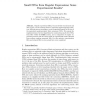Free Online Productivity Tools
i2Speak
i2Symbol
i2OCR
iTex2Img
iWeb2Print
iWeb2Shot
i2Type
iPdf2Split
iPdf2Merge
i2Bopomofo
i2Arabic
i2Style
i2Image
i2PDF
iLatex2Rtf
Sci2ools
109
Voted
CORR
2010
Springer
2010
Springer
Small NFAs from Regular Expressions: Some Experimental Results
Regular expressions (REs), because of their succinctness and clear syntax, are the common choice to represent regular languages. However, efficient pattern matching or word recognition depend on the size of the equivalent nondeterministic finite automata (NFA). We present the implementation of several algorithms for constructing small -free NFAs from REs within the FAdo system, and a comparison of regular expression measures and NFA sizes based on experimental results obtained from uniform random generated REs. For this analysis, nonredundant REs and reduced REs in star normal form were considered.
CORR 2010 | Education | Equivalent Nondeterministic Finite | Random Generated Res | Regular Expression |
Related Content
| Added | 09 Dec 2010 |
| Updated | 09 Dec 2010 |
| Type | Journal |
| Year | 2010 |
| Where | CORR |
| Authors | Hugo Gouveia, Nelma Moreira, Rogério Reis |
Comments (0)

